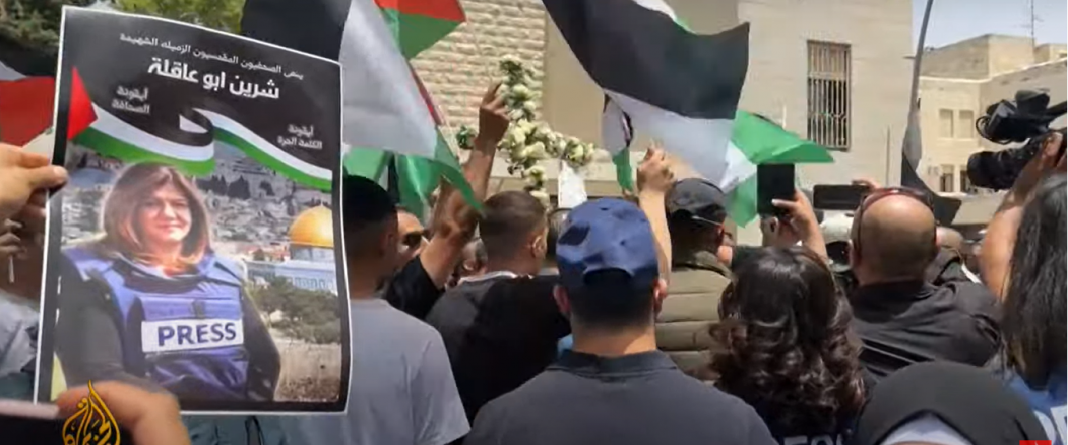By Alice Pistolesi
Violence broke out even at the funeral of journalist Shereen Abu Akleh, killed on 11 May while following an Israeli raid on the Jenin refugee camp in the West Bank.
At the funeral of the Al Jazeera reporter, yesterday afternoon, violent clashes occurred while the body was transferred – accompanied by a long mourning procession – from Saint Louis French Hospital to the Sheikh Jarrah neighbourhood in East Jerusalem, where Abu Akleh’s body remained overnight. In videos released by Palestinian broadcasters and Al Jazeera, Abu Akleh’s coffin seems almost to be falling, while police were trying to snatch Palestinian flags from the people attending the procession. Thousands of people took part in the funeral of the reporter.
According to the Palestinian Ministry of Health, it was the Israeli forces’ bullets that killed the journalist, and all the testimonies collected on the ground also confirm this version of events, which Israel denies. Only to then backtrack. The Jewish State has in fact retracted an earlier statement that emphasised the presence of Palestinian fighters in Jenin and raised the possibility that they had killed Abu Akleh. The Israeli army is now investigating whether one of its soldiers shot the journalist. Al Jazeera writes that after the death of their colleague, the Israeli police raided the house of Abu Akleh’s family and abruptly removed the Palestinian flag. The killing of the journalist sparked outrage among Palestinians and fears were raised of increased tensions in Jerusalem.
Life as journalists in Palestine
The case of Shereen Abu Akleh is not an isolated one. Since 2000, the year the Second Intifada began, the number of journalists who have lost their lives in Palestine is 46, according to the Palestinian press union. Since 1972, there have been 83, according to the Wafa news agency. Since the beginning of 2020, Israel has also imprisoned at least 26 Palestinian journalists in the West Bank.
An April 5, 2022 investigation by The Intercept reports how, in most cases, journalists arrested by Israeli forces were placed in administrative detention for between six weeks and a year and a half. Some of these journalists were indicted, most often for incitement, and spent an average of about eight months in detention. As of March 2022, there were 10 Palestinian journalists in Israeli jails on charges related to publishing material online, either as private individuals or through their professional work. In some cases, the journalists were subsequently indicted on charges unrelated to their professional work; in others, no charges were filed and the journalist was imprisoned without trial and eventually released. Often the journalist is accused of participating in a political event as a photographer or journalist. But the Israeli authorities make no distinction between a journalist who is in the field as part of his work and an active participant’.
Reporters without Borders, in its fact sheet on Palestine, writes that ‘The conflict with Israel has a great impact on Palestinian journalists and covering the protests is extremely dangerous. Journalists are subject to arrests, violence, destruction of equipment, legal proceedings and denial of accreditation. They have suffered serious injuries when Israeli soldiers use live bullets to disperse protesters.
High tension in the West Bank
The journalist killed in Jenin was following the situation in the West Bank which has been particularly tense since 9 April, when Jenin residents celebrated the 20th anniversary of the Israeli attack on the city’s refugee camp, a date that has become a symbol of Palestinian resistance against the Israeli occupation. On the anniversary day, Israeli forces launched a large-scale raid on the camp, killing one Palestinian and injuring 13 others. On 5 May, 16 more Palestinians were injured today when Israeli police broke up a protest at the Al Aqsa Mosque in East Jerusalem after the religious site was occupied by Israeli extremists. The protests came after Jewish visits to the site resumed and coincided with the anniversary of Israel’s independence in 1948. Israeli police dispersed the Palestinian protesters with batons and rubber bullets.
The violence in recent weeks on the Esplanade of Mosques and the firing of rockets both from the Gaza Strip have raised fears of a further escalation of the conflict as happened from 6 to 21 May last year in Gaza. With the clashes on 2 May, the day of Eid al Fitr (the end of Ramadan), more than 300 Palestinians were injured. On 30 April, Hamas had threatened to conduct attacks against synagogues in the event of new raids by the Israeli Defence Forces (IDF) on the holy site. “Whoever takes the decision to repeat this scene (of a deployment of Israeli forces inside the mosque) will take the decision to destroy thousands of synagogues around the world,” Yahya Sinwar, head of Hamas in the Gaza Strip, said in a speech.
The hypothesis of an armed National Civil Guard
Adding to the scenario of high tension is the Israeli debate on the creation of an armed National Civil Guard. As reported by the newspaper Haaretz, Prime Minister Naftali Bennett has speculated about establishing a new law enforcement agency to combat terrorism. Bennett has therefore instructed the National Security Council to present ‘an orderly and budgeted plan to establish a National Civil Guard’ by the end of May.
Cover image: standstill image from an AlJazeera video of Palestinian protests.
























